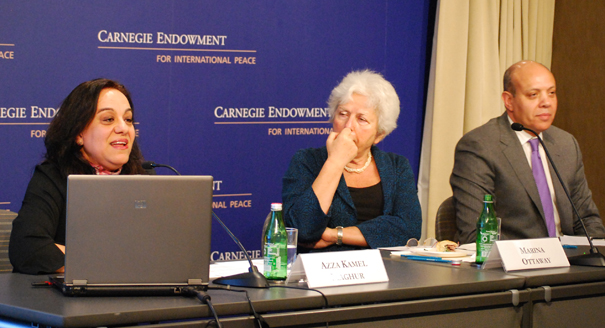Registration
Thank you!
You will receive an email confirming your registration.
The Libyan transition has entered the difficult phase of creating a new political system. This system will be shaped by elections, the writing of a constitution, and the balance of political power among the many groups that participated in the uprising and still hold sway in the country.
To examine current developments and challenges in Libya’s transition process, Carnegie hosted a panel discussion with Azza Kamel Maghur, a Libyan lawyer and democracy advocate, and the American-Libyan Council's Fadel Lamen. Carnegie's Marina Ottaway moderated.
Current Challenges Facing the Libyan Transition
- Security: The security situation in Libya needs to be addressed, Maghur said. She suggested that the best way to restore security was by integrating freedom fighters into state institutions; controlling the proliferation of arms; building proper police and military forces and institutions; and developing a strategy to deal with the criminals released from prison by the previous regime. Lamen added that demobilizing the militias, a critical step in building security, has proven difficult because demobilization efforts lack sufficient funding, a clear plan, and a role for local councils in the process.
- National Reconciliation: The National Transitional Council (NTC) needs to take an active role in designing a framework for national reconciliation and work with civil society, tribes, and religious leaders to achieve reconciliation, Maghur stated.
- Judicial Reform: The Libyan judiciary is facing enormous challenges, Maghur said. It needs to be reformed and strengthened in order to play its role in the transition.
- Amendments to the Constitutional Declaration: Article 30 of the Constitutional Declaration should be amended to grant the General National Congress (GNC) that will be elected in June legislative power only, rather than legislative and executive power, Maghur asserted. This will help prevent the GNC from accumulating too much power, she explained.
- Centralization: As a result of Qadhafi’s legacy, many Libyans are resistant to central authority, Lamen added. This legacy of mistrust compounds the difficulty of building a strong and stable political system in Libya. Furthermore, inefficacy continues to plague the country’s state bureaucracy, which also hinders efforts to build trust in the central government. Finally, a centralized government cannot bring the local militias under control. This can only be accomplished by the local councils.
- Vision for the Future: The NTC and central government have not yet articulated a clear vision for the future, and the Constitutional Declaration falls short of what is needed, Lamen concluded.
Future of the National Transitional Council of Libya
- Replacing the NTC: In accordance with the August 2011 Constitutional Declaration, the NTC will be replaced by the elected General National Congress, a 200-member constituent assembly, Maghur said. This body will rule until the new constitution is adopted and be replaced by a parliament elected under the new charter.
- Challenges: Maghur outlined a number of problems with the NTC in its current form:
- Lack of Transparency: The NTC needs to act with greater transparency. She suggested one way they could do this would be to publish all new laws on the NTC website.
- Lack of Dialogue: The NTC needs to move beyond a ‘policy of exclusion’ and establish a framework for working with Libyan experts and civil society.
- Lack of Confidence: The NTC needs to be willing to take an active role in addressing key issues such as security and national reconciliation.
- Lack of Transparency: The NTC needs to act with greater transparency. She suggested one way they could do this would be to publish all new laws on the NTC website.
- Lack of Legitimacy: Lamen added that the NTC also lacks legitimacy and recommended a number of steps to make the body more democratic, such as:
- Legislative or Executive Power: The NTC needs to demarcate the boundaries of its power and redefine its role as a legislative body only, with executive power in the hands of the government.
- Experts: The NTC needs to incorporate democracy experts into its body.
- Local Elections: The NTC should be restructured. First, the country needs to elect local councils. Each local council will then send two representatives to the new NTC, which would thus acquire legitimacy. Including representatives from the local councils will also connect the national and local governments and could increase the influence the national government has with the local militias, Lamen commented.
- Legislative or Executive Power: The NTC needs to demarcate the boundaries of its power and redefine its role as a legislative body only, with executive power in the hands of the government.
- International Community: The international community should partner with civil society and local Libyan non-governmental organizations and not restrict themselves to working with the NTC, Maghur added.
